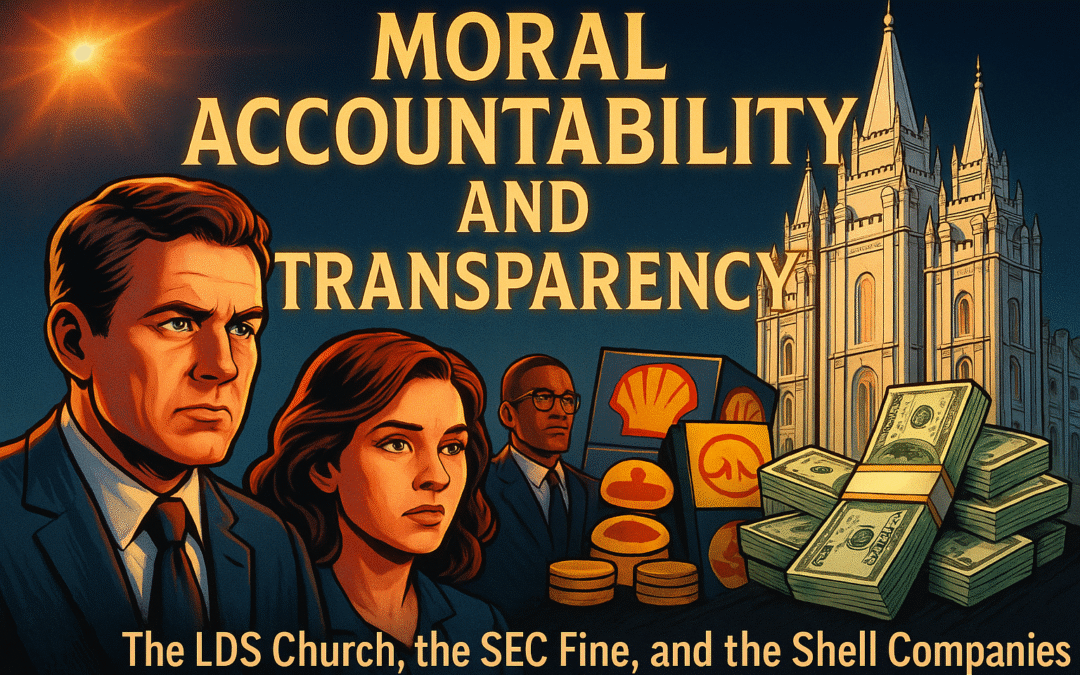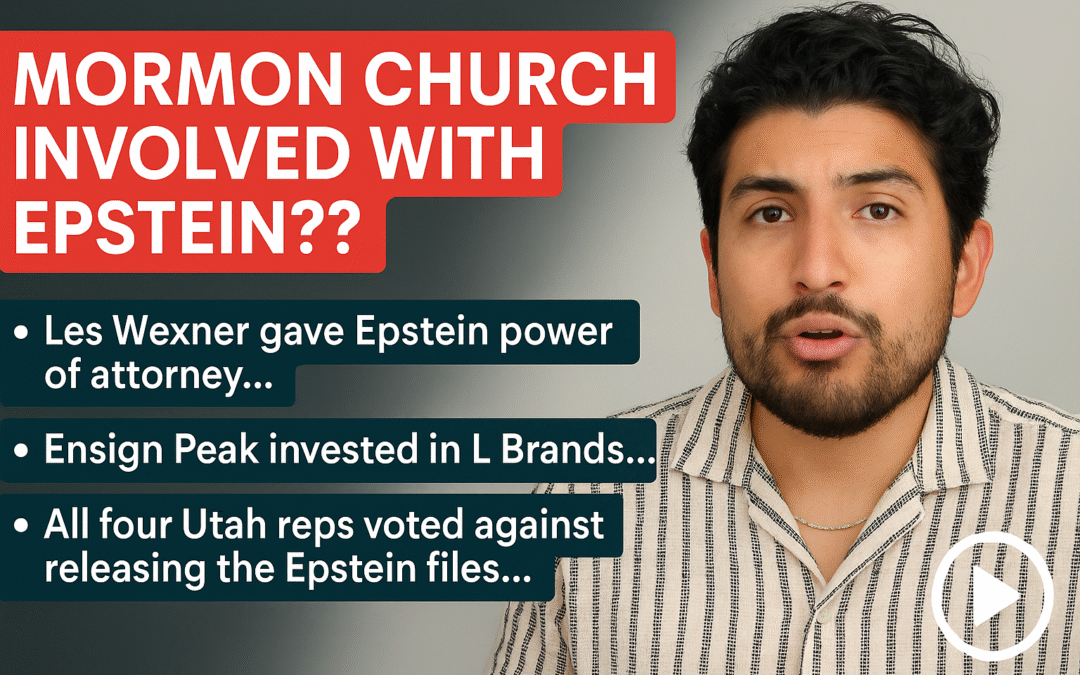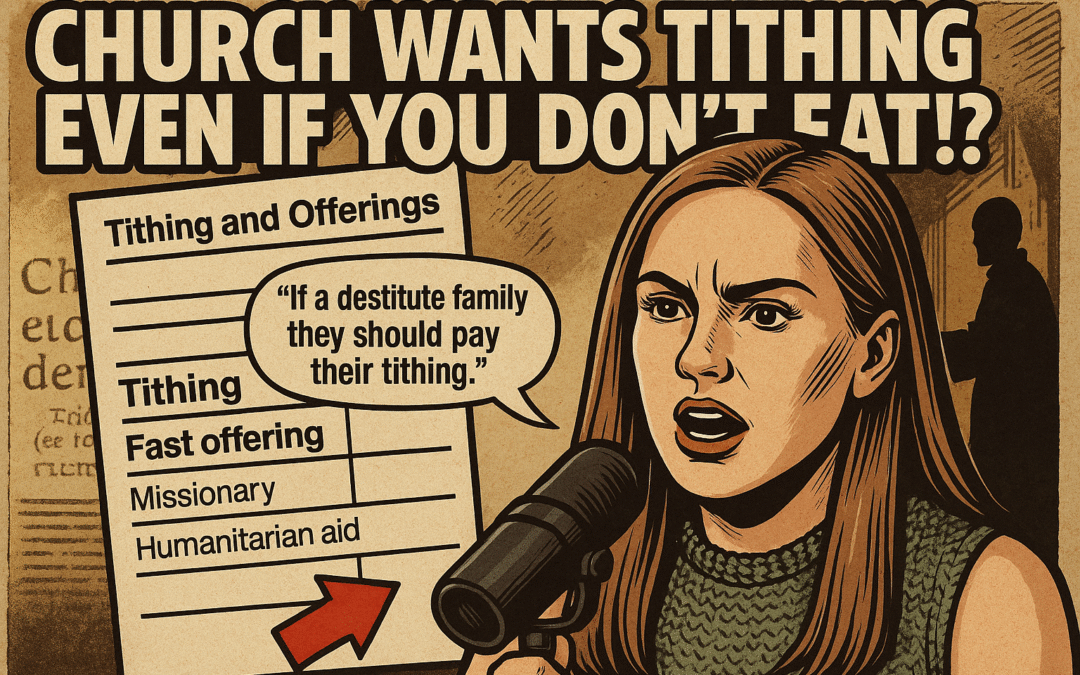
by Anonymous | Jul 23, 2025 | Church Finances
Bottom Line
This isn’t about whether the Church can have wealth. It’s about whether it will honor God in how it stewards that wealth. Legal strategies matter—but moral accountability matters more. Members deserve not only reassurance, but real transparency. And the Lord, if He truly leads the Church, requires nothing less.
The LDS Church, the SEC Fine, and the Shell Companies: A Spiritual and Practical Analysis
📜 The Background
In February 2023, the U.S. Securities and Exchange Commission (SEC) fined Ensign Peak Advisors (EPA)—the investment arm of The Church of Jesus Christ of Latter-day Saints—$4 million, and the Church itself $1 million. The SEC found that from 1997 to 2019, Ensign Peak used 13 shell LLCs to file misleading investment disclosures, effectively concealing the true size and identity of the Church’s investment portfolio (then worth over $30 billion; now estimated near $100 billion). The Church settled without admitting wrongdoing.
The SEC’s report states the Church went to “great lengths” to avoid disclosure, a phrase many critics interpret as confirming systemic deception.
🧭 LDS Doctrine on Honesty and Obedience to Law
Latter-day Saints hold honesty as a sacred covenantal principle, not just an ethical guideline. It’s embedded in:
- Temple recommend interviews: “Are you honest in your dealings with your fellow men?”
- Articles of Faith #12 & #13: “We believe in being honest, true, chaste…”
- Scripture:
- D&C 134:6 – “We believe that all men are bound to sustain and uphold the respective governments in which they reside.”
- Alma 27:27 – “They were distinguished for their zeal… and their honesty.”
Thus, when an institution that proclaims divine guidance is caught violating federal disclosure laws—even civilly—it invites spiritual scrutiny as well as public criticism.
🧠 Why the Church Did It: The Institutional Logic
The Church has stated that it sought to:
- Preserve the sanctity of sacred funds by avoiding public scrutiny and speculation.
- Protect donor privacy to discourage targeting or harassment.
- Prevent manipulation or market distortion caused by public knowledge of its financial footprint.
In effect, the Church was using perfectly legal strategies—until the SEC ruled that the intent behind those strategies constituted misleading conduct under securities law.
🛡️ The Legal Line Crossed
- Using LLCs to manage investments is not inherently illegal.
- But intentionally masking control and beneficial ownership over $100 billion in assets year after year violated SEC transparency rules.
- Once exposed, Ensign Peak began filing properly in 2020 and settled the case civilly.
🙏 Spiritual Analysis: Where the Church Fell Short
Despite legal motivations, the spiritual concern is this:
⚖️ Intent matters. So does perception.
Even if Church lawyers believed they were acting within the law, the intent to obscure violates the higher law of moral honesty—especially for a Church that requires moral rectitude from its members.
Scriptures reinforcing this principle:
- Mosiah 2:22 – “He doth require that ye should do as he hath commanded you… and be honest.”
- 2 Corinthians 8:21 – “Providing for honest things, not only in the sight of the Lord, but also in the sight of men.”
🧎♂️ Shouldn’t the Lord’s Church Lead by Example?
Members pay tithing in faith, often at personal sacrifice. Discovering that their sacred funds were protected by a shell game—even if well-intentioned—has rightly provoked disappointment, anger, and demands for accountability.
💡 Why Did the SEC Fine Matter So Much?
- It confirmed long-standing suspicions about financial secrecy.
- It contrasted with the Church’s teachings about integrity.
- It revealed dissonance between global financial reality and local member experience.
🧭 The Best Defense: Context, Not Excuses
A fair rebuttal acknowledges the Church’s missteps but also frames the institutional context:
- The Church did not engage in fraud, embezzlement, or insider trading.
- It has since changed its practices and now complies with disclosure laws.
- No funds were lost or stolen.
- Intent was institutional privacy, not personal gain.
- All major religions use tax-exempt strategies to some extent.
But again—“To whom much is given, much is required.”
💬 Balanced Bottom Line
The LDS Church made a serious error in prioritizing financial opacity over transparency. Though not criminal, its legal workaround violated the spirit of its own doctrine on honesty. It must now earn back the trust of its members through transparency, humility, and clear accountability.
📖 Recommended Actions for the Church (Spiritually and Practically)
- Public repentance and acknowledgment, not just legal compliance.
- Detailed annual financial disclosures to members.
- Increase humanitarian aid and ward budgets.
- Model institutional integrity alongside personal virtue.
- Demonstrate that sacred funds serve sacred ends.

by Anonymous | Jul 23, 2025 | Church Conspiracy
Bottom Line
This TikTok attempts to frame the LDS Church as morally culpable through unrelated financial investments. It’s dishonest, manipulative, and disrespects the complexity of modern investment systems.
| Platform |
TikTok |
| Creator |
Jorge Lopez (@jorgesanch333z) |
| Category |
Financial Ethics & Political Manipulation |
| Quote |
“So most people don’t know that Les Wexner, the former CEO of L Brands… gave Jeffrey Epstein full power of attorney… And on top of that, Ensign Peak (Mormon Church) was an investor in L Brands… through shell companies… And all four Utah representatives voted against releasing the Epstein files… This is all so suspicious…” — Jorge Lopez, |
| Core Claim |
The LDS Church knowingly invested in L Brands (linked to Epstein) and covered it up via shell companies; Utah politicians helped hide Epstein’s crimes. |
| Conclusion |
Misleading / Guilt by Association Fallacy |
| Logical Questions |
- Did Ensign Peak knowingly support Epstein-linked entities?
- Were the shell companies criminal or standard investment structures?
- Do passive investments equate to moral complicity?
|
🔍 Core Finding
1. Passive ≠ Complicit. Ensign Peak manages billions across diversified portfolios like most institutional investors. No evidence supports the Church having operational control over L Brands or knowledge of Epstein’s conduct through Les Wexner.
2. “Shell Companies” were regulatory, not criminal. The Church’s 2023 SEC settlement confirms failure to file correctly—not illegal behavior. Many nonprofits and religious groups use intermediaries for privacy and protection.
3. L Brands ≠ Epstein. L Brands was a global brand. Wexner’s poor personal judgment doesn’t taint every shareholder. Claiming so is emotional misdirection and guilt by association.
4. Utah Reps ≠ Church Plot. The Epstein vote (Roll Call 136) split by party, not religion. LDS Church did not direct or lobby the vote. Utah Republicans often vote with national GOP strategy.
🧠 Manipulation & Logic Check
- Fallacy: Guilt by association (Church → Wexner → Epstein).
- Emotional trigger: Weaponizes Epstein’s crimes to imply institutional corruption without evidence.
⚠️ Defamation Risk
While not direct, the accusation pattern may rise to reckless implication. Linking a religion to crimes without evidence introduces reputational harm risk.
📚 Sources

by Anonymous | Jul 22, 2025 | Church Finances
Bottom Line
Quoting a devotional metaphor without its full spiritual context misrepresents both the doctrine and the practice. The Church teaches sacrifice — not starvation. And compassion is the rule, not cruelty.
| Podcast |
YouTube – Alyssa Grenfell |
| Episode |
“How the Mormon Church Secretly Built a $293 Billion Fortune” |
| Category |
Tithing Doctrine & Poverty |
| Quote |
“If a destitute family is faced with the decision of paying their tithing or eating, they should pay their tithing.” — Narrator quoting Elder Lynn G. Robbins, 00:01:00 |
| Core Claim |
The LDS Church encourages starving members to pay tithing before buying food, regardless of personal need. |
| Conclusion |
Partial Truth / Doctrinally Isolated & Out-of-Context Quote |
| Logical Questions |
- Was this quote presented with full doctrinal context?
- Do bishops require tithing before giving aid?
- How does the Church treat struggling members?
|
🔍 Core Finding
The quote is real, but it’s not policy. Elder Lynn G. Robbins used it in a sermon to teach faith during hardship, not to promote starvation. The Church’s actual welfare system is built on feeding the hungry — not testing them.
📖 What Elder Robbins Actually Said
“If a destitute family is faced with the decision of paying their tithing or eating, they should pay their tithing.” “But they should also go to their bishop for help.”
— GC, Apr. 2005
🧾 Church Policy vs. Sermon Metaphor
- Bishops are instructed to help the poor regardless of tithing status.
- Tithing is voluntary and not enforced by penalty.
- Fast offerings and humanitarian funds exist to meet basic needs.
📚 Sources

by Anonymous | Jul 21, 2025 | Church Finances
Bottom Line
The SEC fine was real but not for fraud, theft or criminal deception. The violation was technical. The money was never hidden from Church leaders or misused. There was no fraud charge, no missing funds, and no accusation of wrongdoing toward Church members. This claim is a textbook case of exaggerating a filing error into a scandal.
| Podcast |
YouTube Alyssa Grenfell |
| Episode |
“How the Mormon Church Secretly Built a $293 Billion Fortune” |
| Title |
“The Church was fined for purposefully concealing its money” |
| Category |
Church Finance & Legal Reporting |
| Quote |
“The church was fined $5 million by the SEC, by the federal government, for purposefully concealing just how much money that they had.” |
| Timestamp |
00:04:12 |
| Core Claim |
The LDS Church was fined by the SEC for deliberately hiding its massive wealth from regulators and the public. |
| Conclusion |
Partial Truth / Framing Exaggeration |
| Logical Questions |
- Was the Church fined for concealing wealth?
- Did the SEC accuse the Church of fraud or misuse of funds?
- What was the actual reason for the fine?
|
🔍 Core Finding
Yes, the Church and Ensign Peak Advisors were fined $5 million by the SEC in 2023 — but not for concealing the amount of wealth they held. The fine was related to how they reported their holdings through shell LLCs, not for hiding money from members or regulators.
📊 What the SEC Actually Said
“The Church and Ensign Peak caused the Church’s investment portfolio to be misstated in 13F filings… The SEC’s order finds that the Church was aware of the use of shell companies and approved the structure.”
— SEC Press Release, Feb. 2023
The fine was for technical disclosure violations — not fraud, not misuse of tithing, and not for lying to members.
🧠 What the Narrator Gets Wrong
Saying the Church was fined for “purposefully concealing how much money they had” is a dramatic oversimplification. The SEC did not allege the Church was hiding total assets. It cited irregularities in how stock holdings were filed — using third-party LLCs to mask identity, not the amount.
📖 Church Response
“Ensign Peak and the Church have cooperated with the government… We affirm our commitment to comply with the law, regret mistakes made, and now consider this matter closed.”
— Church Statement, Feb. 2023
📚 Sources

by Anonymous | Jul 21, 2025 | Church Finances
Bottom Line
There’s no evidence the Church wanted to hide its reserves from members. It simply didn’t publish full balance sheets — a common religious practice. The rest is narrative spin. Without a verifiable quote, this framing falls apart.
| Podcast |
YouTube – Alyssa Grenfell |
| Episode |
“How the Mormon Church Secretly Built a $293 Billion Fortune” |
| Category |
Church Wealth & Financial Framing |
| Quote |
“The Mormon Church doesn’t want people to know that it controls $293 billion. It doesn’t want its own members to know. But now they do.” |
| Core Claim |
The LDS Church intentionally hid its $293 billion in financial holdings not only from the public, but from its own members. |
| Conclusion |
False / Conspiratorial Framing with Misleading Certainty |
| Logical Questions |
- Has the Church actively suppressed knowledge of its assets?
- Is there evidence that members were intentionally deceived?
- Was $293 billion confirmed or independently verified?
|
🔍 Core Finding
This claim assumes not only secrecy but intentional deception, which is not supported by any direct quote or evidence from Church leaders. The Church has long acknowledged its investments and reserves — what’s debated is the total amount, not the existence of funds.
💰 Transparency and Doctrine
The Church teaches financial self-reliance and has always encouraged members to save for the long term. Leaders such as President Gordon B. Hinckley and President Russell M. Nelson have repeatedly discussed wise financial preparation.
📊 Ensign Peak and the SEC
In 2023, the SEC fined Ensign Peak for disclosure violations — not for fraud or misuse. The Church settled and took responsibility for using shell companies to file required disclosures, but no member funds were misused, and the investment practices were legal.
📚 Sources





